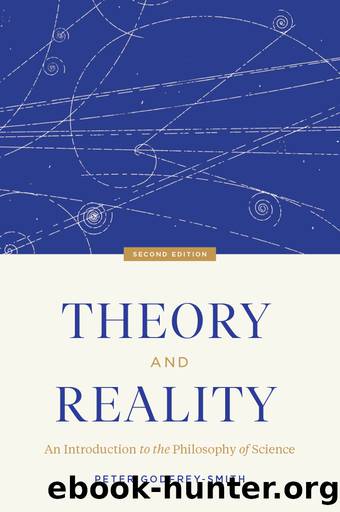Theory and Reality, Second Edition: An Introduction to the Philosophy of Science by Peter Godfrey-Smith

Author:Peter Godfrey-Smith [Godfrey-Smith, Peter]
Language: eng
Format: epub
Tags: PHI000000 Philosophy / General, PHI004000 Philosophy / Epistemology, SCI075000 Science / Philosophy & Social Aspects
Publisher: The University of Chicago Press
9.2 Quine and Others
The birth of modern naturalism is often said to be the publication of W. V. Quineâs paper âEpistemology Naturalizedâ (1969). But modern naturalism did not come entirely out of Quine. The American philosopher John Dewey is usually thought of as a pragmatist, but during the later part of his career (from roughly 1925 onward) he presented his philosophy as a form of naturalism. In some areas, Deweyâs version of naturalism is superior to Quineâs. But Deweyâs philosophy was neglected during the second half of the twentieth century, and Quine is the figure who had the most influence on the movement.
In âEpistemology Naturalized,â Quine made a number of claims. He first attacked the idea that philosophers should give foundations for scientific knowledge. Quineâs claims on this point have become widely accepted by naturalists. But Quine also made a more radical claim. He suggested that epistemological questionsâphilosophical questions about evidence and justificationâare so closely tied to questions in scientific psychology that epistemology should not survive as a distinct field at all. Instead, epistemology should be absorbed into psychology. The only questions asked by epistemologists that have real importance, in Quineâs view, are questions that can be answered by psychology itself. Psychology will eventually give us a purely scientific description of how beliefs are formed and how they change, and we should ask for no more.
This version of naturalism is one that I, and many others, oppose. Quine seems to be claiming that philosophers interested in questions about belief and knowledge should close up shop and go home. Itâs not surprising that philosophers, especially those who want to remain employed, would object to Quine on this point, but itâs not only a matter of wanting to keep paying the rent; there is a deeper issue here.
In a different version of naturalism, there is such a thing as a philosophical question, distinct from the kinds of questions asked by scientists. A naturalist can think that science can contribute to the answers to philosophical questions, without thinking that science should replace philosophical questions with scientific ones. That is the version of naturalism that I defend. This contrasts with the kind of naturalism described by Quine in his 1969 paper; there we think of science as the only proper source of questions as well as the source of answers.
If we think that philosophical questions are important and also tend to differ from those asked by scientists, there is no reason to expect a replacement of epistemology by psychology and other sciences. Science is a resource for philosophy, not a replacement.
What might be examples of these questions that remain relevant in naturalistic philosophy but are not directly addressed within science itself? Many naturalists have argued that normative questions are important cases hereâquestions that involve a value judgment. If epistemology was absorbed by psychology, we might get a good description of how beliefs are actually formed, but apparently we would not be told which belief-forming mechanisms are good and which are bad. We would not
Download
This site does not store any files on its server. We only index and link to content provided by other sites. Please contact the content providers to delete copyright contents if any and email us, we'll remove relevant links or contents immediately.
Phoenicians among Others: Why Migrants Mattered in the Ancient Mediterranean by Denise Demetriou(606)
american english file 1 student book 3rd edition by Unknown(604)
Verus Israel: Study of the Relations Between Christians and Jews in the Roman Empire, AD 135-425 by Marcel Simon(590)
Caesar Rules: The Emperor in the Changing Roman World (c. 50 BC â AD 565) by Olivier Hekster(571)
Basic japanese A grammar and workbook by Unknown(571)
Europe, Strategy and Armed Forces by Sven Biscop Jo Coelmont(520)
Give Me Liberty, Seventh Edition by Foner Eric & DuVal Kathleen & McGirr Lisa(496)
Banned in the U.S.A. : A Reference Guide to Book Censorship in Schools and Public Libraries by Herbert N. Foerstel(485)
The Roman World 44 BC-AD 180 by Martin Goodman(478)
Reading Colonial Japan by Mason Michele;Lee Helen;(467)
DS001-THE MAN OF BRONZE by J.R.A(462)
Introducing Christian Ethics by Samuel Wells and Ben Quash with Rebekah Eklund(455)
Imperial Rome AD 193 - 284 by Ando Clifford(454)
The Oxford History of World War II by Richard Overy(453)
The Dangerous Life and Ideas of Diogenes the Cynic by Jean-Manuel Roubineau(451)
Catiline by Henrik Ibsen--Delphi Classics (Illustrated) by Henrik Ibsen(426)
Language Hacking Mandarin by Benny Lewis & Dr. Licheng Gu(409)
Literary Mathematics by Michael Gavin;(407)
Brand by Henrik Ibsen--Delphi Classics (Illustrated) by Henrik Ibsen(389)
